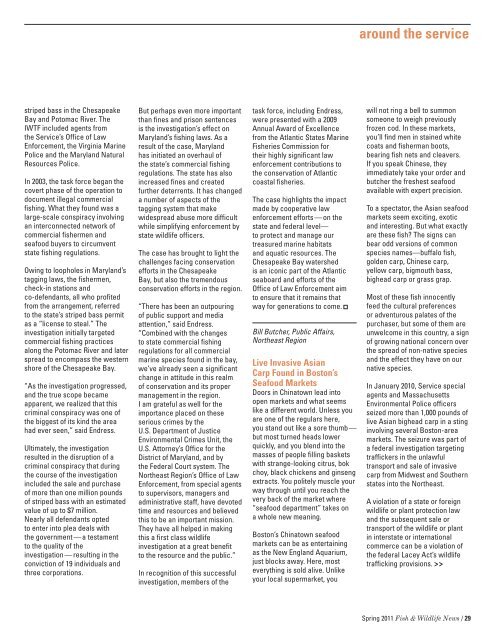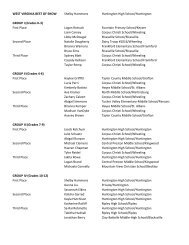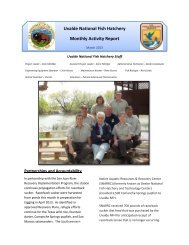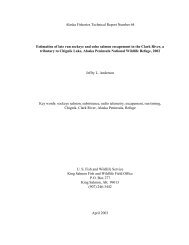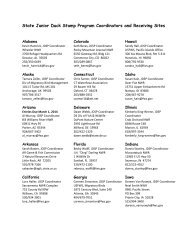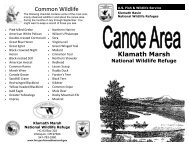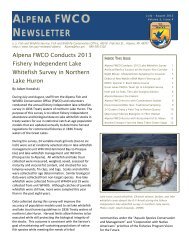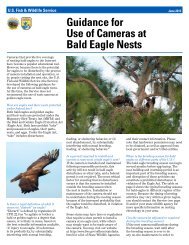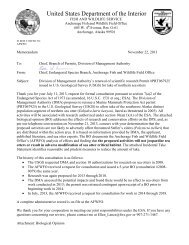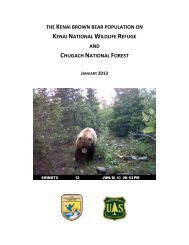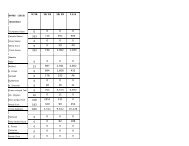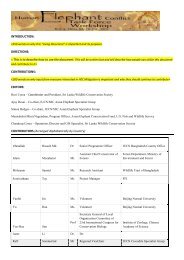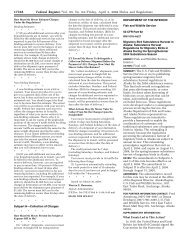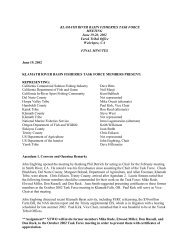Fish &Wildlife News - U.S. Fish and Wildlife Service
Fish &Wildlife News - U.S. Fish and Wildlife Service
Fish &Wildlife News - U.S. Fish and Wildlife Service
Create successful ePaper yourself
Turn your PDF publications into a flip-book with our unique Google optimized e-Paper software.
around the service<br />
striped bass in the Chesapeake<br />
Bay <strong>and</strong> Potomac River. The<br />
IWTF included agents from<br />
the <strong>Service</strong>’s Office of Law<br />
Enforcement, the Virginia Marine<br />
Police <strong>and</strong> the Maryl<strong>and</strong> Natural<br />
Resources Police.<br />
In 2003, the task force began the<br />
covert phase of the operation to<br />
document illegal commercial<br />
fishing. What they found was a<br />
large-scale conspiracy involving<br />
an interconnected network of<br />
commercial fishermen <strong>and</strong><br />
seafood buyers to circumvent<br />
state fishing regulations.<br />
Owing to loopholes in Maryl<strong>and</strong>’s<br />
tagging laws, the fishermen,<br />
check-in stations <strong>and</strong><br />
co-defendants, all who profited<br />
from the arrangement, referred<br />
to the state’s striped bass permit<br />
as a “license to steal.” The<br />
investigation initially targeted<br />
commercial fishing practices<br />
along the Potomac River <strong>and</strong> later<br />
spread to encompass the western<br />
shore of the Chesapeake Bay.<br />
“As the investigation progressed,<br />
<strong>and</strong> the true scope became<br />
apparent, we realized that this<br />
criminal conspiracy was one of<br />
the biggest of its kind the area<br />
had ever seen,” said Endress.<br />
Ultimately, the investigation<br />
resulted in the disruption of a<br />
criminal conspiracy that during<br />
the course of the investigation<br />
included the sale <strong>and</strong> purchase<br />
of more than one million pounds<br />
of striped bass with an estimated<br />
value of up to $7 million.<br />
Nearly all defendants opted<br />
to enter into plea deals with<br />
the government — a testament<br />
to the quality of the<br />
investigation — resulting in the<br />
conviction of 19 individuals <strong>and</strong><br />
three corporations.<br />
But perhaps even more important<br />
than fines <strong>and</strong> prison sentences<br />
is the investigation’s effect on<br />
Maryl<strong>and</strong>’s fishing laws. As a<br />
result of the case, Maryl<strong>and</strong><br />
has initiated an overhaul of<br />
the state’s commercial fishing<br />
regulations. The state has also<br />
increased fines <strong>and</strong> created<br />
further deterrents. It has changed<br />
a number of aspects of the<br />
tagging system that make<br />
widespread abuse more difficult<br />
while simplifying enforcement by<br />
state wildlife officers.<br />
The case has brought to light the<br />
challenges facing conservation<br />
efforts in the Chesapeake<br />
Bay, but also the tremendous<br />
conservation efforts in the region.<br />
“There has been an outpouring<br />
of public support <strong>and</strong> media<br />
attention,” said Endress.<br />
“Combined with the changes<br />
to state commercial fishing<br />
regulations for all commercial<br />
marine species found in the bay,<br />
we’ve already seen a significant<br />
change in attitude in this realm<br />
of conservation <strong>and</strong> its proper<br />
management in the region.<br />
I am grateful as well for the<br />
importance placed on these<br />
serious crimes by the<br />
U.S. Department of Justice<br />
Environmental Crimes Unit, the<br />
U.S. Attorney’s Office for the<br />
District of Maryl<strong>and</strong>, <strong>and</strong> by<br />
the Federal Court system. The<br />
Northeast Region’s Office of Law<br />
Enforcement, from special agents<br />
to supervisors, managers <strong>and</strong><br />
administrative staff, have devoted<br />
time <strong>and</strong> resources <strong>and</strong> believed<br />
this to be an important mission.<br />
They have all helped in making<br />
this a first class wildlife<br />
investigation at a great benefit<br />
to the resource <strong>and</strong> the public.”<br />
In recognition of this successful<br />
investigation, members of the<br />
task force, including Endress,<br />
were presented with a 2009<br />
Annual Award of Excellence<br />
from the Atlantic States Marine<br />
<strong>Fish</strong>eries Commission for<br />
their highly significant law<br />
enforcement contributions to<br />
the conservation of Atlantic<br />
coastal fisheries.<br />
The case highlights the impact<br />
made by cooperative law<br />
enforcement efforts — on the<br />
state <strong>and</strong> federal level—<br />
to protect <strong>and</strong> manage our<br />
treasured marine habitats<br />
<strong>and</strong> aquatic resources. The<br />
Chesapeake Bay watershed<br />
is an iconic part of the Atlantic<br />
seaboard <strong>and</strong> efforts of the<br />
Office of Law Enforcement aim<br />
to ensure that it remains that<br />
way for generations to come.<br />
Bill Butcher, Public Affairs,<br />
Northeast Region<br />
Live Invasive Asian<br />
Carp Found in Boston’s<br />
Seafood Markets<br />
Doors in Chinatown lead into<br />
open markets <strong>and</strong> what seems<br />
like a different world. Unless you<br />
are one of the regulars here,<br />
you st<strong>and</strong> out like a sore thumb —<br />
but most turned heads lower<br />
quickly, <strong>and</strong> you blend into the<br />
masses of people filling baskets<br />
with strange-looking citrus, bok<br />
choy, black chickens <strong>and</strong> ginseng<br />
extracts. You politely muscle your<br />
way through until you reach the<br />
very back of the market where<br />
“seafood department” takes on<br />
a whole new meaning.<br />
Boston’s Chinatown seafood<br />
markets can be as entertaining<br />
as the New Engl<strong>and</strong> Aquarium,<br />
just blocks away. Here, most<br />
everything is sold alive. Unlike<br />
your local supermarket, you<br />
will not ring a bell to summon<br />
someone to weigh previously<br />
frozen cod. In these markets,<br />
you’ll find men in stained white<br />
coats <strong>and</strong> fisherman boots,<br />
bearing fish nets <strong>and</strong> cleavers.<br />
If you speak Chinese, they<br />
immediately take your order <strong>and</strong><br />
butcher the freshest seafood<br />
available with expert precision.<br />
To a spectator, the Asian seafood<br />
markets seem exciting, exotic<br />
<strong>and</strong> interesting. But what exactly<br />
are these fish? The signs can<br />
bear odd versions of common<br />
species names—buffalo fish,<br />
golden carp, Chinese carp,<br />
yellow carp, bigmouth bass,<br />
bighead carp or grass grap.<br />
Most of these fish innocently<br />
feed the cultural preferences<br />
or adventurous palates of the<br />
purchaser, but some of them are<br />
unwelcome in this country, a sign<br />
of growing national concern over<br />
the spread of non-native species<br />
<strong>and</strong> the effect they have on our<br />
native species.<br />
In January 2010, <strong>Service</strong> special<br />
agents <strong>and</strong> Massachusetts<br />
Environmental Police officers<br />
seized more than 1,000 pounds of<br />
live Asian bighead carp in a sting<br />
involving several Boston-area<br />
markets. The seizure was part of<br />
a federal investigation targeting<br />
traffickers in the unlawful<br />
transport <strong>and</strong> sale of invasive<br />
carp from Midwest <strong>and</strong> Southern<br />
states into the Northeast.<br />
A violation of a state or foreign<br />
wildlife or plant protection law<br />
<strong>and</strong> the subsequent sale or<br />
transport of the wildlife or plant<br />
in interstate or international<br />
commerce can be a violation of<br />
the federal Lacey Act’s wildlife<br />
trafficking provisions. >><br />
Spring 2011 <strong>Fish</strong> & <strong>Wildlife</strong> <strong>News</strong> / 29


